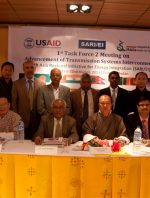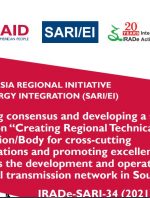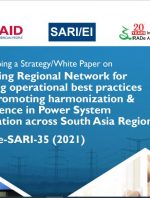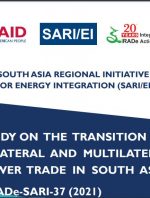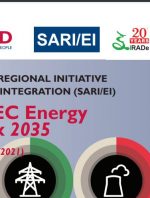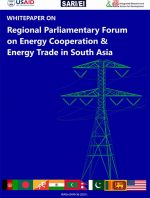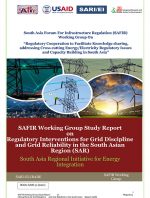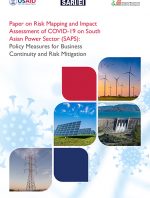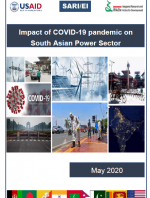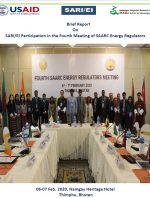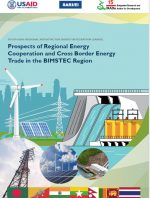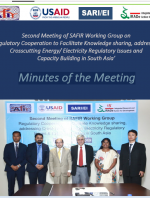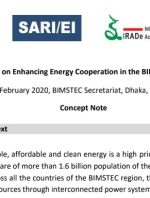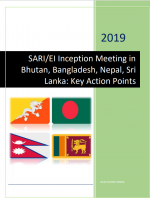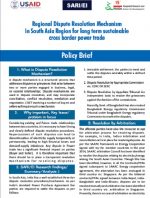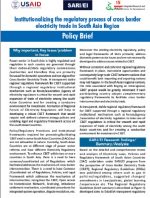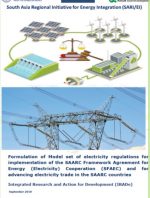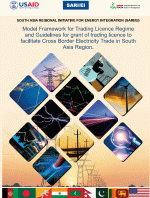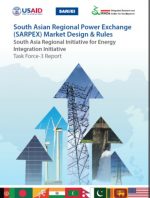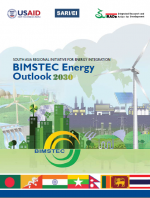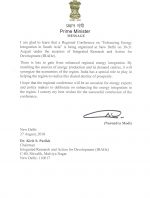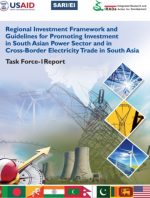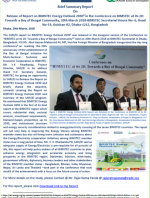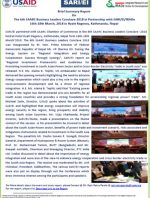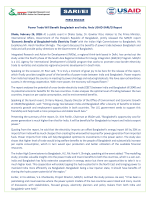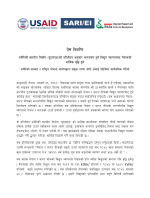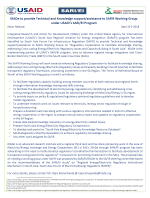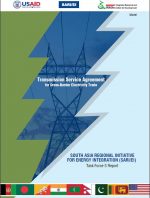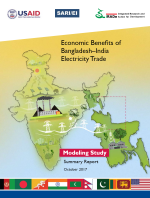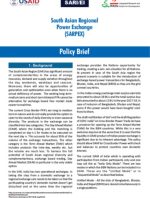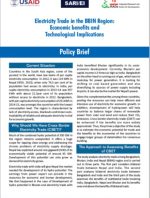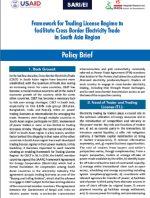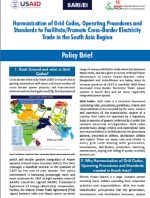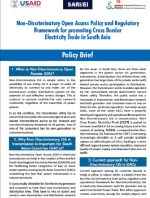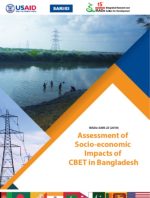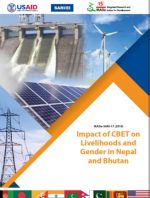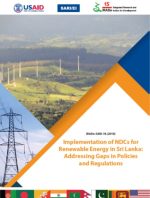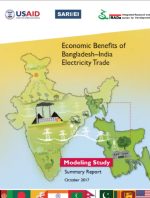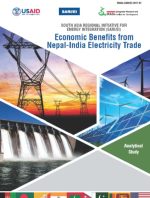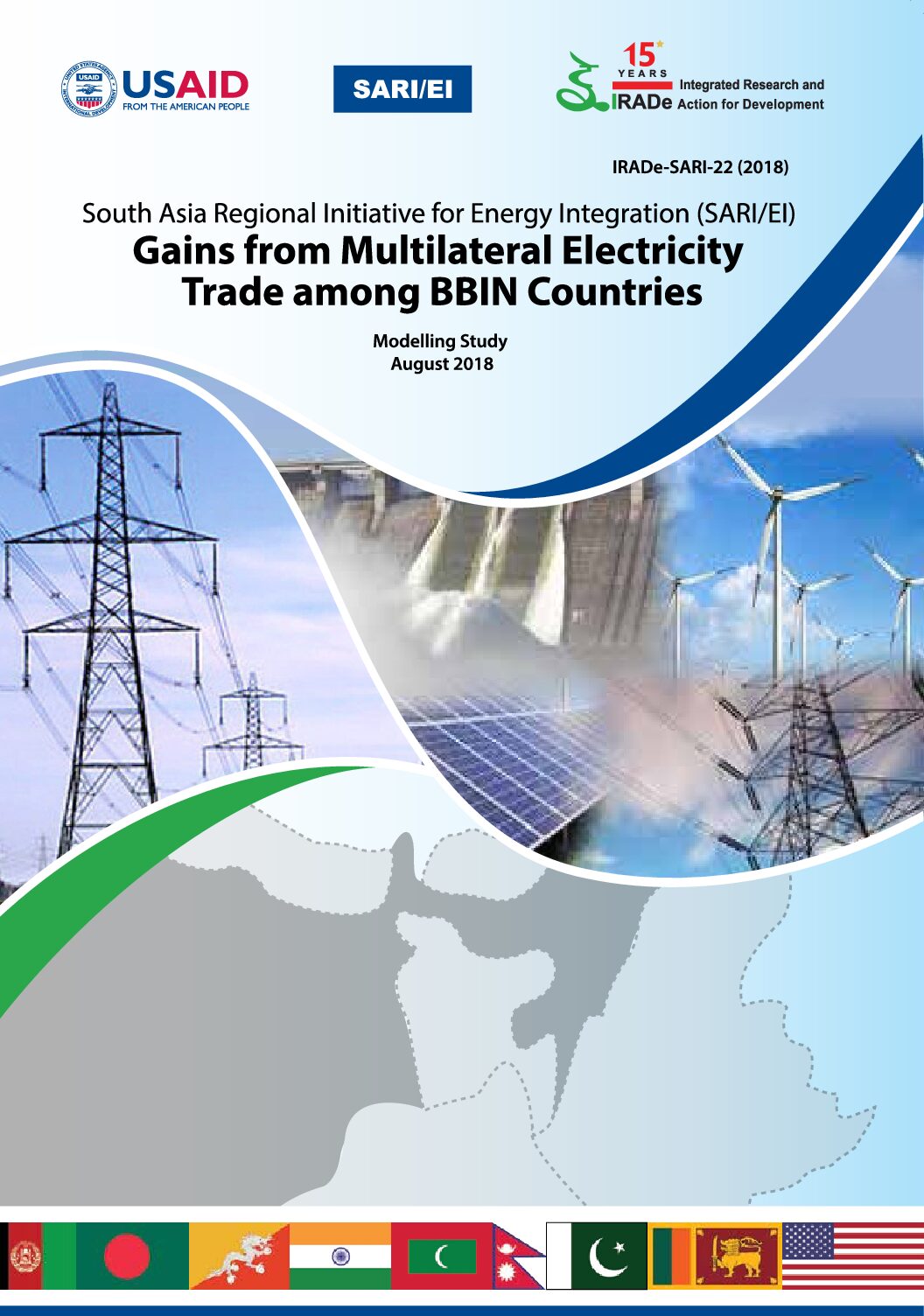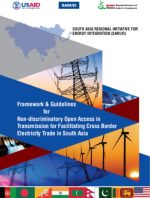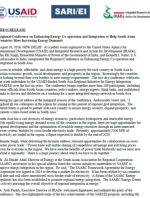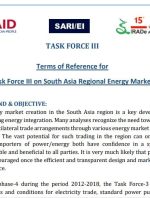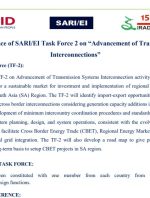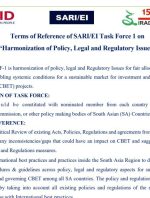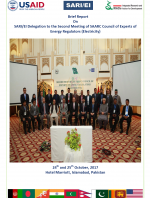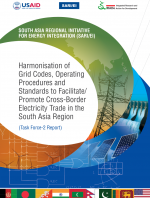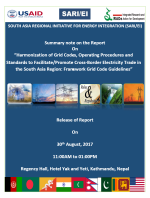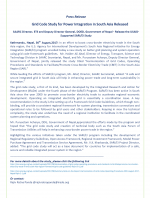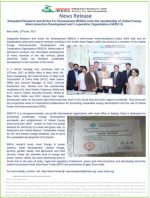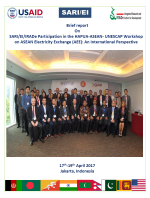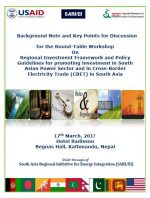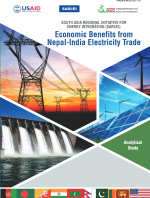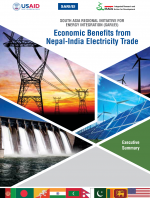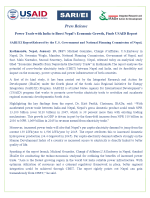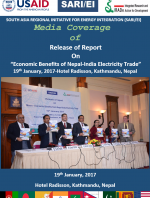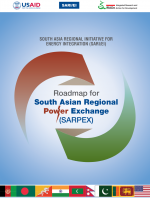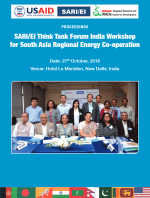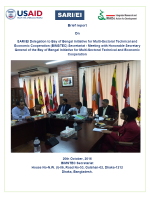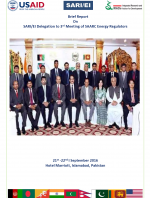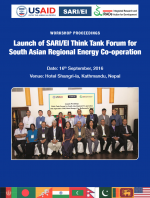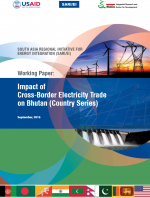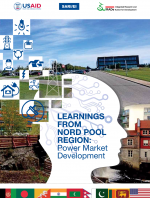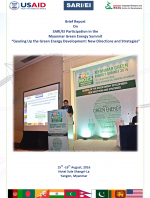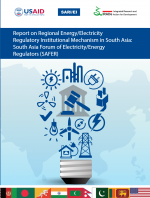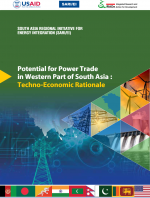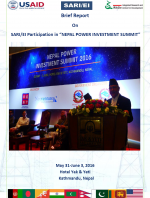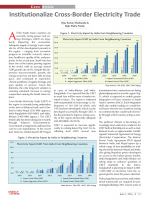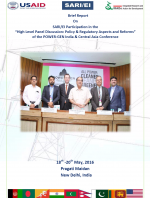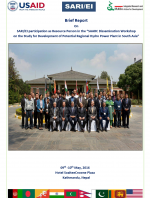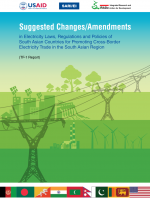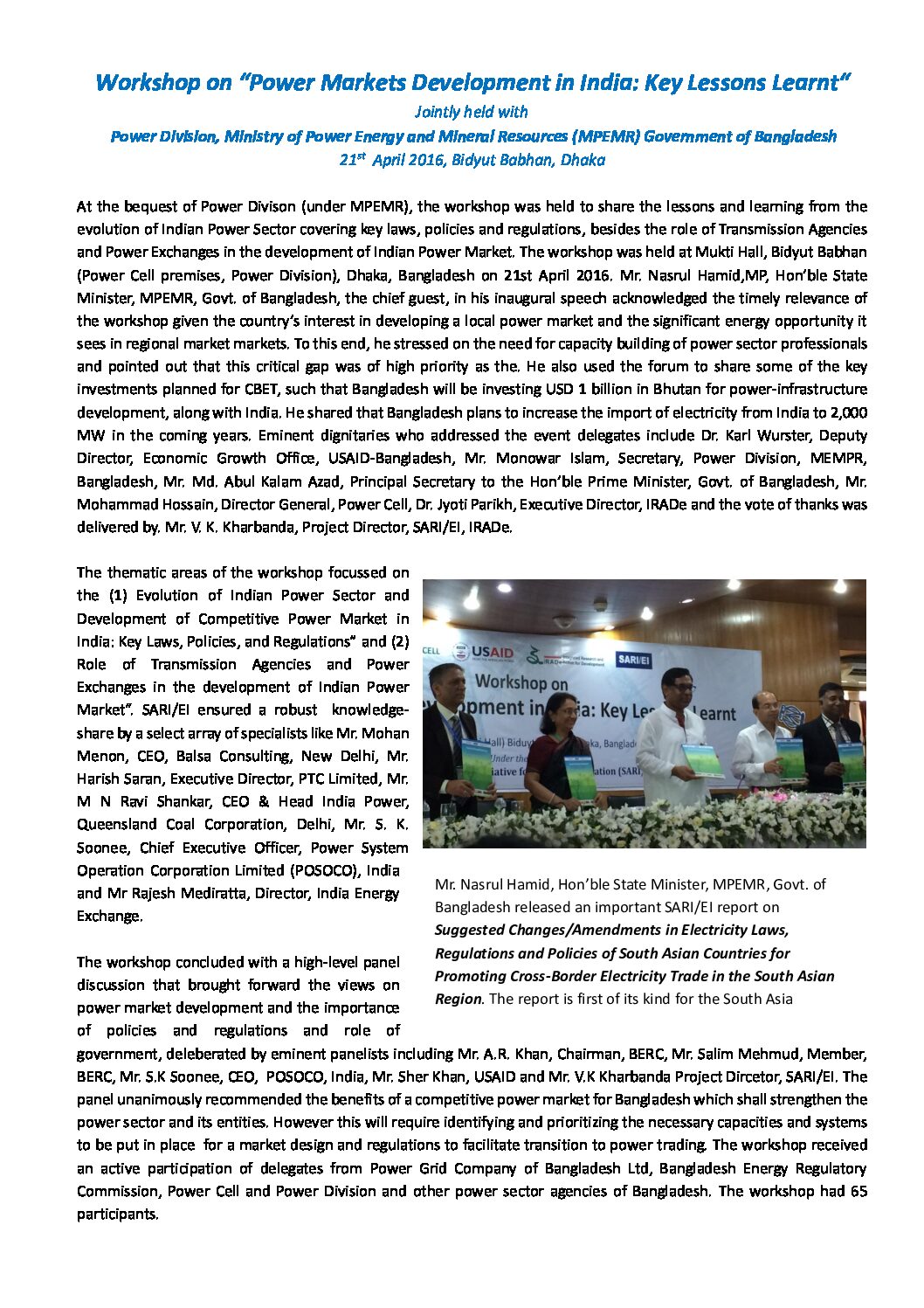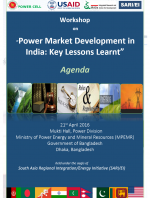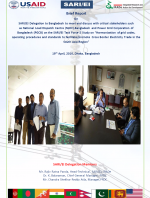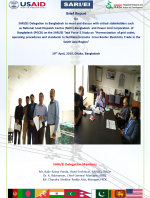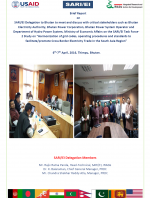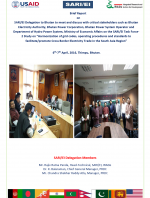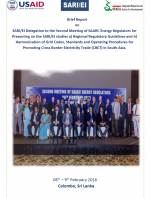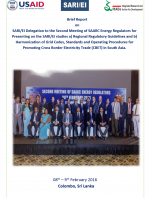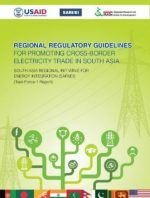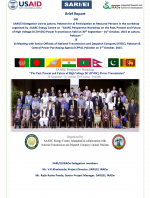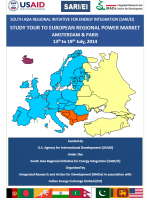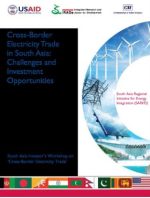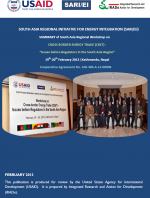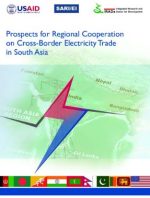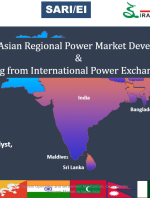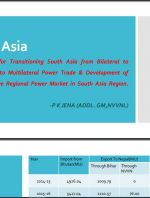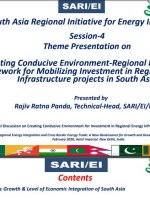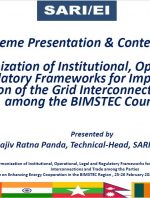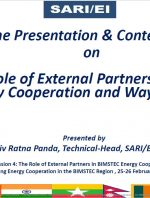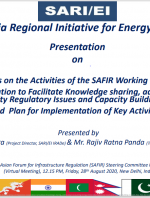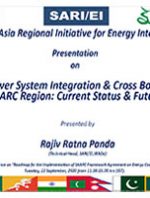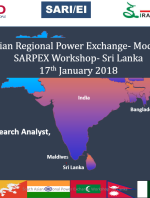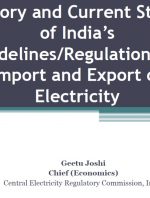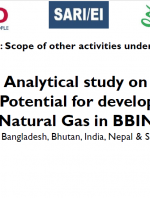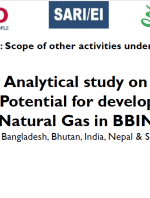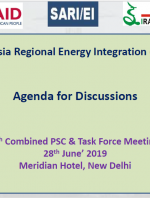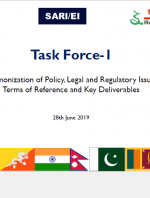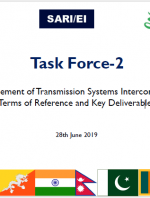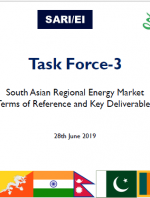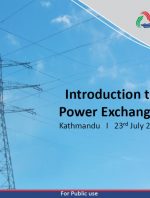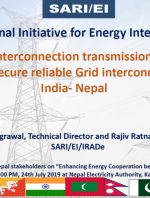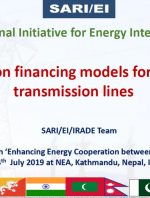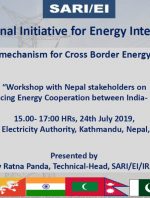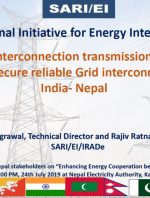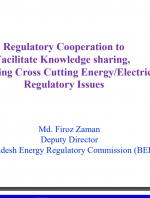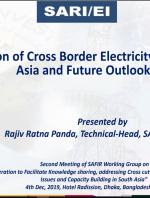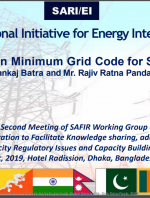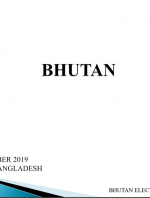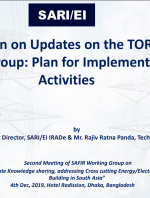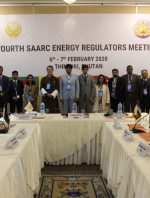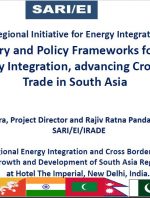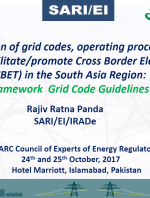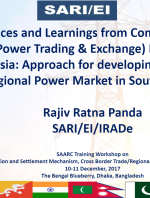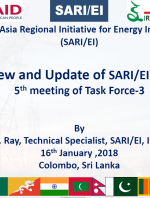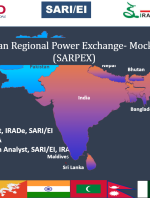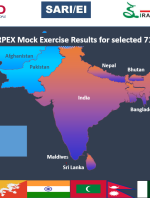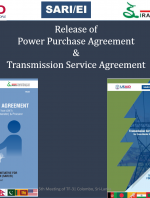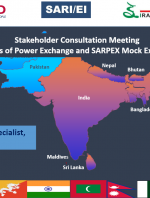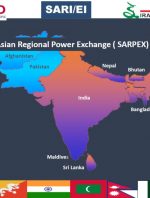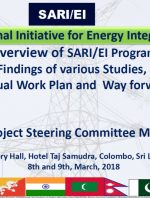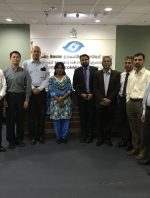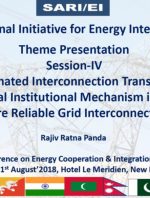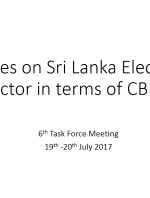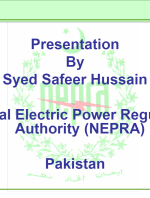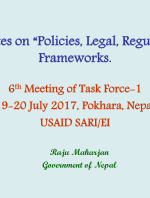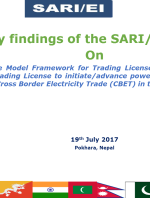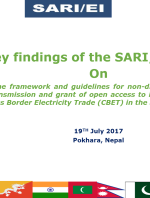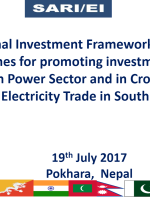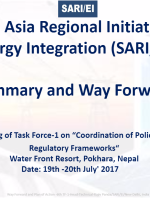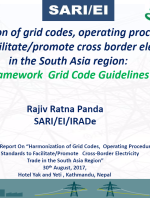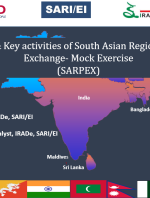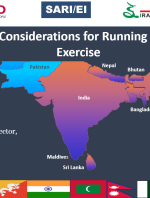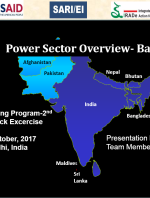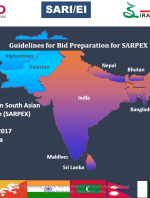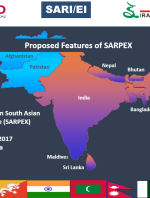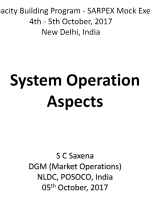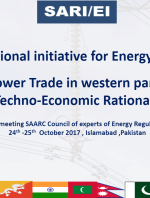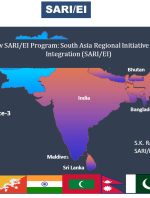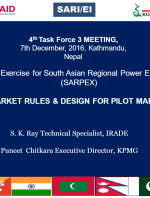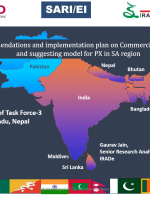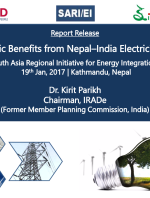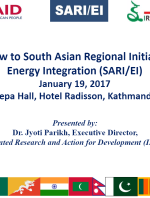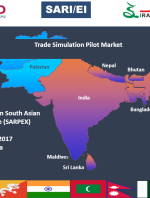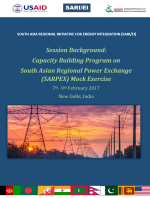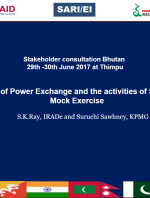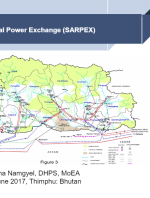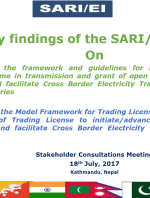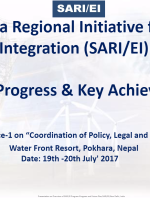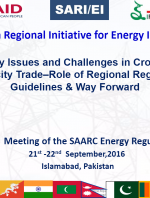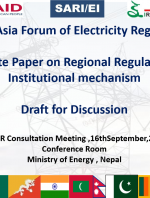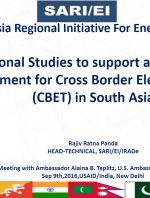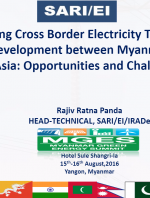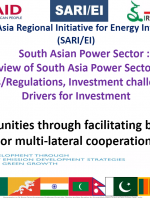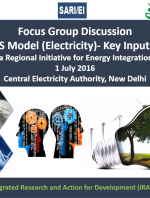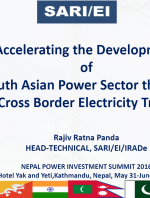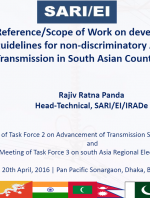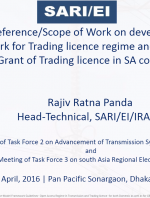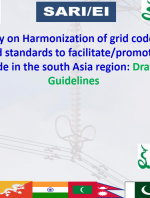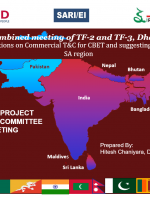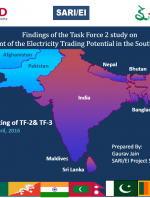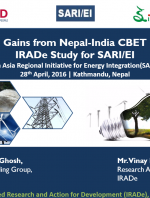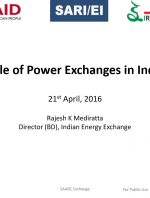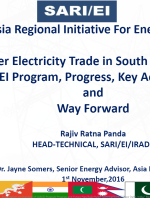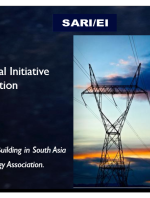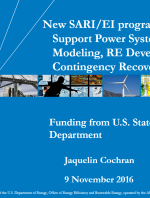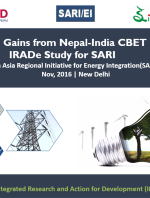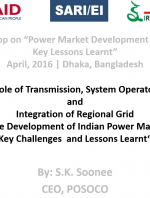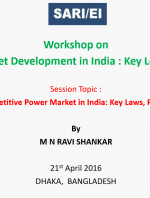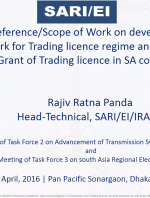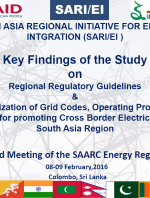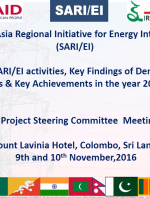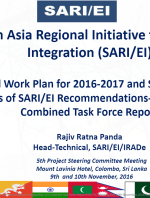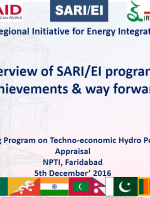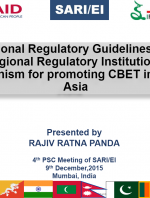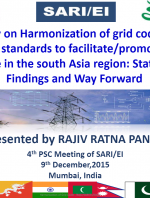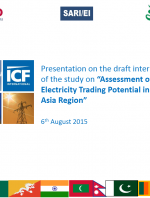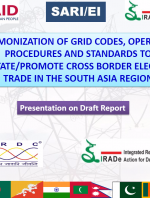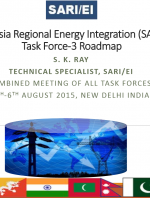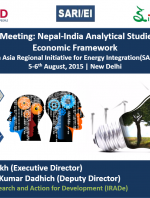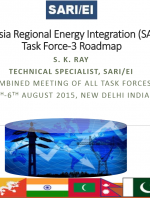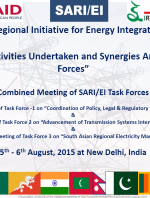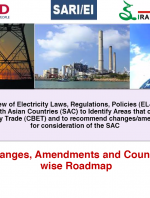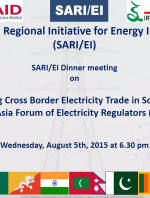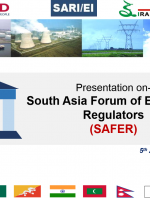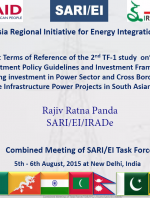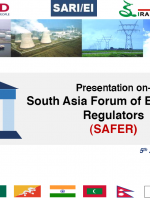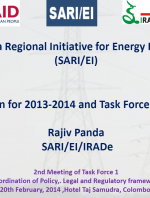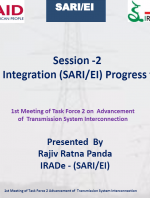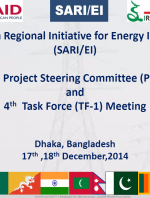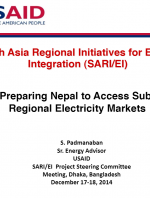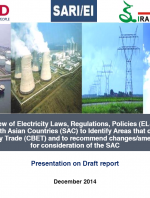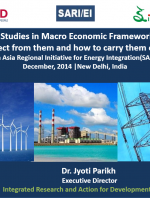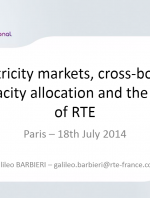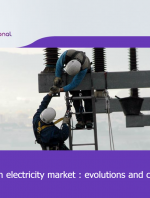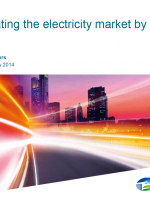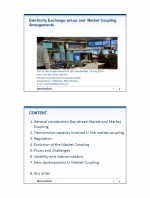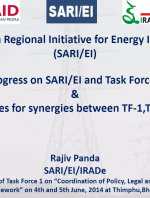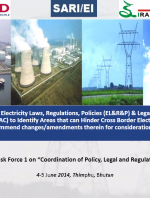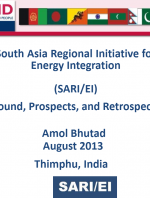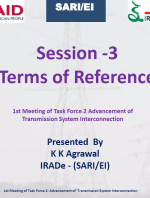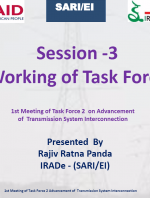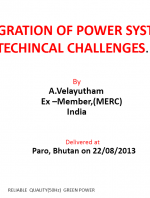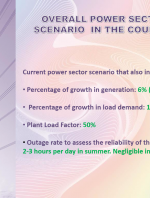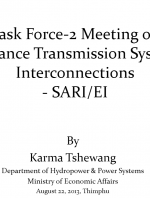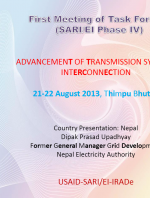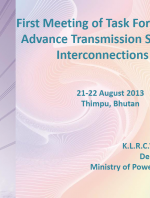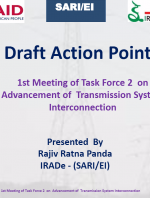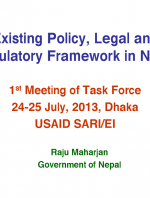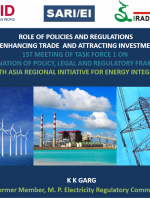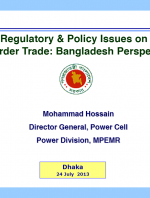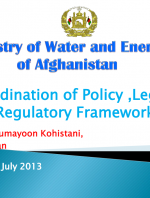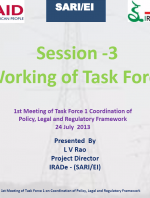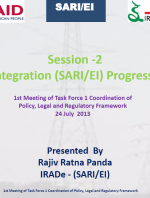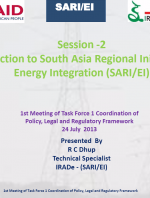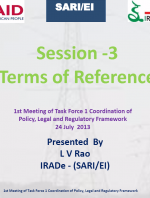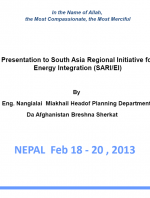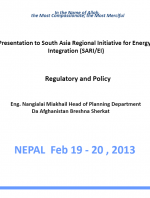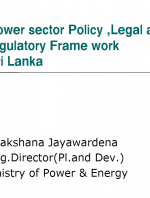Report
Presentations
PSC Meetings
Task Force Meetings
Report
Synopsis: One of the challenges faced by countries in South Asia is mobilizing investments at an affordable cost required for building the generation capacities and regional transmission network in the region because hydro and thermal power projects (which form bulk of the regional power trade in Bangladesh-Bhutan-India-Nepal region) and regional transmission networks are both capital and time intensive in nature.
Synopsis: The South Asian countries have been undertaking Cross Border Electricity Trade (CBET) through transmission
interconnections for over five decades. In the eastern region, CBET is undertaken between India and the other three countries viz. Bangladesh, Bhutan and Nepal.
Synopsis: South Asia is amongst the fastest growing regions in the World driving forward the global economic growth. With rapid economic growth, the energy demand in South Asia is expected to more than double by 2030 against 20181 levels.
Synopsis: This report is part of the study undertaken on “The transition to trilateral and multilateral power trade in South Asia”, under USAID’s South Asia Regional Initiative for Energy Integration (SARI/EI) program.
Synopsis: The Bay of Bengal Initiative for Multi Sectoral Technical and Economic Cooperation (BIMSTEC) is a regional organization comprising seven Member States (Bangladesh, Bhutan, India, Myanmar, Nepal, Sri Lanka and Thailand) lying in the littoral and adjacent areas of the Bay of Bengal constituting a contiguous regional unity.
Synopsis: The United States Agency for International Development (USAlD) is an independent government agency that provides economics, development and humanitarian assistance around the world in support of the foreign policy goals of the United States. USAID’s mission is to dvance broad-based economics growth, democracy, and human progress in developing countries and emerging economies.
Synopsis: The BBINS region currently resides in an energy paradox, being rich in energy reserves while lagging in access to reliable, affordable, and clean energy on the other hand.
Synopsis: The draft Report was circulated to the key officials and decision makers in South Asian Country governments (Energy/Power Ministries), Electricity Regulatory Commissions, Planning Authorities etc. Their feedback and thoughts have helped make this report more robust and relevant to all the stakeholders.
Synopsis: COVID-19 has impacted economies across the world in unprecedented ways, including by taking a toll on the South Asian power sector.
Synopsis: Based on the invitation received Mr. Rajiv Ratna Panda, Associate Director, SARI/EI/IRADe participated as speaker in the second in a 2021 series of webinar from the Clean Energy Ministerial’s Regional and Global Energy Interconnection (RGEI) Initiative held on 4th March,2021 and presented on “One Sun One World One Grid: Energy Integration in South Asia”.
Synopsis: I would like to take this opportunity to acknowledge the excellent work done by the SARI/EI team at IRADe andloitte India in developing the background paper.
Synopsis: Natural gas (NG) is less polluting than other fossil fuels for power generation, as also for transportation, household and industry sector and also offers economic advantage in preference to other fuel options.
Synopsis: Coronavirus Disease (COVID-19) is an infectious disease caused by a newly discovered and highly contagious Coronavirus. The virus was stated to have originated sometime in the month of December 2019 in the Wuhan district of China.
Synopsis: The “#9pm9minute” candle light event on 3rd April demonstrated both the high resilience of the Indian Grid, as well as the unique level of cooperation amongst the BBIN countries (Bangladesh, Bhutan, India and Nepal) towards operation of the regional grid.
Synopsis: Based on the invitation received from SAARC Secretariat, Kathmandu, Nepal, SARI/EI Delegation comprising of Mr. Rajiv Ratna Panda, Technical-Head, SARI/EI/IRADe participated in the 4th Meeting Fourth Meeting of SAARC Energy Regulators, 06-07 Feb. 2020, Thimphu, Bhutan.
Synopsis: The Bay of Bengal Initiative for Multi-Sectoral Technical and Economic Cooperation (BIMSTEC) is a regional orgranization comprising seven Member Stats lying in the littoral and adjacent areas of the Bay of Bengal- Bangladesh, Bhutan, Inida, Myanmar, Nepal, Sri Lanka and Thailand
Synopsis: SAFIR Working Group Members from Bangladesh, Bhutan and India made country presentations on their
respective country’s existing energy /electricity regulatory framework and presented their perspective on
regulatory issues, followed with discussions.
Synopsis: Access to reliable, affordable and clean energy is a high priority to support rapid economic growth and improved welfare of more than 1.6 billion population of the Bay of Bengal region. With the rapidly rising demand across all the countries of the BIMSTEC region, there are huge opportunities for optimization of energy resources through interconnected power system in the region.
Synopsis: The Bay of Bengal Initiative for MultiSectoral Technical and Economic Cooperation (BIMSTEC) is a regional organization comprising seven member states (Bangladesh, Bhutan, India, Myanmar, Nepal, Sri Lanka and Thailand). The regional group constitutes a bridge between South and South East Asia and represents a reinforcement of relations among these countries
Synopsis: SARI/EI/IRADe participation in the South Asia Forum for Infrastructure Regulation Regulators (SAFIR) Executive Committee Meeting (ECM) held on 22nd November 2018 at Taj Tashi, Thimphu, Bhutan and SARI/EI/IRADe meeting with Bhutan Stakeholders for gathering support and cooperation for extended Phase of SARI/EI Program on 23rd November 2018.
Synopsis: Electricity for peace and development: South Asian grid connectivity is an idea whose time has come by Dr. Jyoti Parikh, ED,IRADe
Synopsis: Integrated Research and Action for Development (IRADe), under the The USAID SARI/EI program organized a “South Asian Electricity Regulators’ Exchange: Towards Institutionalizing a Regional Energy Regulators’ Forum” on 16th and 17th December in Delhi, comprising Chairpersons, members and senior delegates from Bangladesh, Bhutan, India, Nepal and Sri Lanka.
Synopsis: In south Asia, India has a well – established three tier dispute resolution procedures / mechanism.
Synopsis: Given the importance urgent need to create such a forum / association in the south asia region within minimum time frame
Synopsis: The above points to the need for a common harmonized regulatory framework for CBETin south asia that may address many of the shortcomings in the existing arrangements.
Synopsis: This study discusses the current political, policy, economic and institutional barriers to regional crossborder electricity trade linking South Asia (SA) and Southeast Asia (SEA).
Synopsis: Report on “Model Framework for Trading Licence Regime and Guidelines for grant of trading licence to facilitate Cross Border Electricity Trade in South Asia Region”
Synopsis: Overview of South Asia and it’s Power Sector
Synopsis: SAFIR Working Group members from South Asian Countries along with representatives of IRADe (Technical and Knowledge support provider to the working group) attended the meeting.
Synopsis: The objective of the SARPEX mock exercise was to explore the feasibility and desirability of a regional power exchange for Bangladesh, Bhutan, Nepal and India (BBIN) by simulating a DayAhead Market (DAM) for these countries.
Synopsis: Cross-Border Electricity Trade (CBET) in South Asia is currently being undertaken in the form of bilateral trade and is limited to the eastern part of South Asia covering India and Nepal; India and Bangladesh; and India and Bhutan. Additionally, Myanmar imports electricity from India, Pakistan imports electricity from Iran, and Afghanistan imports from Uzbekistan, Tajikistan, and Iran.
Synopsis: In the South Asian Region (SAR), a major share of Cross Border Electricity Trade (CBET) has only been enabled between the four countries i.e. Bangladesh, Bhutan, India and Nepal (BBIN).
Synopsis: The BIMSTEC Energy Outlook is a comperhasive study,which not only deals with the current energy situation in the BIMSTEC(Bay of Bengal Initiative for Multi-Sectoral technical and Economic Cooperation)
Synopsis: Message of Honourable Prime Minister of India, Shri Narendra Damodardas Modi Ji for the Regional conference on Enhancing Energy Integration in South Asia
Synopsis: Shri R K Singh, Hon’ble Minister of Power, Government of India and His Excellency Kenneth I. Juster, U.S. Ambassador to India will inaugurate the Regional Conference for Enhancing Energy Co-operation & Integration in South Asia.
Synopsis: SARI-EI-Report on “Regional Investment Framework and Guidelines for promoting investment in South Asian Power Sector & in Cross Border Electricity Trade Projects in South Asian Region”
Synopsis: Brief Summary Report on Release of BIMSTEC Energy Outlook 2030 in the BIMSTEC Conference.
Synopsis: SARI/EI partnered with SAARC Chamber of Commerce in the 6th SAARC Business Leaders Conclave -2018 held at Hotel Hyatt Regency, Kathmandu, Nepal from 16th-18th March’2018
Synopsis: The report discusses the benefits of power trade between Bangladesh and India and will provide policy directions to the Government of Bangladesh.
Synopsis: Post Event Press Release in Neplali-Economic Benefits from Nepal-India Electricity Trade
Synopsis: SARI-EI-IRADe to provide Technical and Knowledge support/assistance to SAFIR Working Group on “Regulatory Cooperation to Facilitate Knowledge sharing, addressing Cross cutting Energy/Electricity Regulatory Issues and Capacity Building in South Asia” under USAID’s SARI-EI Program
Synopsis: The SAFIR Working Group will work towards enhancing Regulatory Cooperation to Facilitate Knowledge sharing, – addressing Cross cutting Energy/Electricity Regulatory Issues and Capacity Building in South Asia-to -facilitate -transparent regulatory framework, -promoting investment in the South Asia Region.
Synopsis: The terms used in this Agreement as defined hereunder shall have the same meaning as assign to them herein.
Synopsis: A Power Purchase Agreement (PPA), or electricity power agreement, is a contract between power seller (generator may be) and power off taker/buyers (utilities). It defines all the commercial terms (includes CoD, schedule for delivery of electricity, penalties for under delivery,payment terms, and termination), for the trade of electricity between two parties.
Synopsis: This study was undertaken through a consultative process that involved stakeholder consultations and workshops in Bangladesh and India. The various stakeholder consultations undertaken for this study:
Synopsis: The South Asian Region (SAR) has significant amount of complementaries in the areas of energy resources, demand and supply variaon throughout the day, weekends, weekdays and seasons. Moreover, there will also be opportunies of generaon cost opmizaon even when there is no actual deficiency of power.
Synopsis: Countries in the South Asia region, some of the poorest in the world, have low levels of per capita electricity consumpon. In 2012, it was 119 kWh in Nepal (WDI, 2015), when only 76.3 per cent of its populaon had access to electricity. In India, per capita electricity consumpon in 2013–14 was 957 kWh with about 21.3per cent of its populaon without access to electricity in 2012.
Synopsis: Globally, 1.3 billion people are without access to electricity, of which around 338 million are in South Asia. Energy poverty is one of the key reasons for the lack of economic development and low gross domesc product (GDP) in South Asia.
Synopsis: In the last few decades, Cross Border Electricity Trade (CBET) in South Asian region have become more established, with the quantum of trade also seeing an increasing trend. For some countries, CBET has become a crucial revenue source to aid in the overall economic growth of the country; while for some other countries, CBET has become a necessary tool to de over energy shortages.
Synopsis: Grid code is a technical document containing rules, procedures, guidelines, criteria and responsibilies to be complied by the users, owners and operators of the transmission system of a country. Grid codes are approved by a regulatory body in exercise of powers conferred to it under the relevant electricity act/legislaon.
Synopsis: Non‐discriminatory OA in simple refers to the possibility of any enty, be it a buyer or seller of electricity, to connect to and make use of the transmission and/or distribuon system on the payment of cost‐reflecve service charges. This is subject to system availability and network constraints, regardless of the ownership of power system.
Synopsis: Integrated Research and Action for Development (IRADe) is the implementing partner of the South Asia Regional Initiative for Energy Integration (SARI/EI) programme supported by the United States Agency for International Development (USAID).
Synopsis: This study is made possible by the support of American people through the United States Agency for International Development (USAID). The content of this study do not necessarily reflect the views of USAID of the United States Government.
Synopsis: SLYCAN Trust wishes to thank our partners United States Agency for International Development (USAID), and Integrated Research and Action for Development (IRADe) for their valuable contribution to the research.
Synopsis: We are pleased to present the report, ‘Economic Benefits of Bangladesh–India Electricity Trade’, carried out under the South Asia Regional Initiative for Energy Integration (SARI/EI) project supported by USAID.
Synopsis: On the Nepal side, we thank our partners IIDS, Nepal, and Dr. Bishnu Dev Pant, Executive Director IIDS and Mr. Pramod Rijal, Economist, IIDS, in particular for the administrative and logistical support in organising the two stakeholder Workshops.
Synopsis: We thank members of Nepal Electricity Authority (NEA) for their support in assessing the Nepal power system model (IRADe Nepal Technology model- INTec) results and for validating the model assumptions for appropriately reflecting the features of Nepal’s power system in a bilateral India-Nepal study.
Synopsis: Reliable power supply and access to energy are critical for economic development of any nation. Sustained poverty reduction is possible through electricity as it supports industrialization, especially through small and medium-sized enterprises.
Synopsis: We are happy to present these proceedings of the regional conference on “Enhancing Energy Cooperation and Integration in South Asia”. IRADe achieved a major six-year milestone of successful completion of the stage-1 of the fourth phase of SARI/EI.
Synopsis: At a public event organized by the United States Agency for International Development (USAID) and Integrated Research and Action for Development (IRADe), Shri RK Singh, Honorable Minister of Power of the Government of India, and Kenneth I. Juster, U.S. Ambassador to India.
Synopsis: A regional energy market creation in the South Asia region is a key development challenge towards advancing energy integration.
Synopsis: The objective of the TF-2 on Advancement of Transmission Systems Interconnection activity shall be to create the enabling conditions for a sustainable market for investment and implementation of regional bilateral transmission interconnections in South Asia (SA) Region.
Synopsis: The key objective of TF-1 is harmonization of policy, legal and Regulatory Issues for fair allocation of costs and risks in order to create the enabling systemic conditions for a sustainable market for investment and implementation of Cross Border Energy Trade (CBET) projects.
Synopsis: Brief Report on SARI/EI Delegation to the Second Meeting of SAARC Council of Experts of Energy Regulators-24-25 Oct 2017,Islamabad, Pakistan
Synopsis: Harmonisation of Grid codes, Operating Procedures and Standards to facilitate/promote Cross-Border Electricity Trade in the South Asia Region- Framework Grid Code Guidelines-Volume-III-Report
Synopsis: Brief Report on SARI-EI Delegation to the “SAARC Training Workshop on “System Operation and Settlement Mechanism, CBET-Regional Power Market in SA”
Synopsis: Summary Note on the Report “Harmonisation of Grid codes, Operating Procedures and Standards to facilitate/promote Cross-Border Electricity Trade in the South Asia Region- Framework Grid Code Guidelines-Volume-III”
Synopsis: Summary Note on the Report “Harmonisation of Grid codes, Operating Procedures and Standards to facilitate/promote Cross-Border Electricity Trade in the South Asia Region- Framework Grid Code Guidelines-Volume-III”
Synopsis: In an effort to boost cross-border electricity trade in the South Asia region, the U.S. Agency for International Development’s South Asia Regional Initiative for Energy Integration (SARI/EI) program unveiled today a new study on better grid planning and system operation using grid code framework guidelines.
Synopsis: Integrated Research and Action for Development (IRADe) a well-known multi-disciplinary policy think tank and an
independent advanced research institute working in the South Asian Region (SAR) has joined as a member of the Global Energy Interconnection Development and Cooperation Organization (GEIDCO).
Synopsis: Brief report on SARI-EI-IRADe Participation in the HAPUA-ASEAN- UNESCAP Workshop on ASEAN Electricity Exchange (AEE)- An International Perspective
Synopsis: South Asia has countries endowed with diverse energy sources with an estimated combined hydro potential of 350 GW (primarily Bhutan, India, Nepal and Pakistan). Harnessing this clean energy potential can accelerate development in the each of the South Asian Countries (SAC) and the region.
Synopsis: As South Asia remains one of the least integrated regions in the world, therefore it has a huge scope to enhance energy security by engaging in significant levels of power trading of themselves.
Synopsis: On the Nepal side, we thank our partners IIDS, Nepal, and Dr. Bishnu Dev Pant, Executive Director IIDS and Mr. Pramod Rijal, Economist, IIDS, in particular for the administrative and logistical support in organising the two stakeholder Workshops.
Synopsis: Michael Gonzales, Chargé d‟Affaires, U.S.Embassy in Nepal, Dr. Swarnim Wagle, Member, National Planning Commission, Government of Nepal, and Smt. Mala Narendra, Second Secretary, Indian Embassy, Nepal, released today an analytical study titled “Economic Benefits from Nepal-India Electricity Trade” in Kathmandu.
Synopsis: Power trade with India will boost Nepal’s economic growth manifold while providing New Delhi with cheap imported electricity, according to a study published by US Agency for International Development.
Synopsis: The preparation of the roadmap, “South Asian Regional Power Exchange” held under the SARI/EI program would not have been possible without the time and support provided by various individuals and organizations.
Synopsis: Without a consistent and coherent regional regulatory framework in place, investment opportunities and, consequently, large-scale CBET between nations that could benefit both importing and exporting nations may not happen. In the South Asian regional context, the risks associated with forging an intra-regional, CBET project would be greatly minimized if each participating country adopts complementary regulatory frameworks to facilitate cross-border interconnection and electricity trade. The SAARC Inter-Governmental Framework Agreement (IGFA) also calls for the need for institutional mechanisms for the coordination of regulations for promoting CBET in the South Asia (SA) region.This paper brings out the above by analyzing the international experiences in power market development and CBET from a) Greater Mekong Region (GMS) b) South African Power Pool (SAPP) c) West African Power Pool (WAPP) d) The Central American Electrical Interconnection System (SIEPAC) e) Nordic Pool and the critical success factors for effective CBET and learnings for South Asian countries from international experiences. The report also highlights the various key drivers of CBET in SA and the current policy, legal, and regulatory frameworks in the region. I hope this paper will be able to initiate further thought-provoking discussions among regulators and power sector stakeholders to take forward the process of coordination of policy and regulation for promoting CBET.
Synopsis: The USAID’s South Asia Regional Initiative for Energy Integration (SARI/EI) program builds energy security, clean energy access and energy markets in the South Asia region through cross-border electricity trade (CBET).
Synopsis: . The idea of “BIMSTEC Energy Outlook“ was positively noted by the Bay of Bengal Initiative for Multi-Sectoral Technical and Economic Cooperation Secretariat.
Synopsis: Mr. V.K.Kharbanda made a detailed presentation titled “Regulatory Issues and Challenges in Cross Border Electricity Trade–Role of Regional Regulatory Guidelines & Way Forward”.
Synopsis: The USAID’s South Asia Regional Initiative for Energy Integration (SARI/El) program advocates energy security, clean energy access and energy markets development in the South Asia region through cross-border electricity trade (CBET).
Synopsis: The preparation of this Working Paper on “Impact of Cross-Border Electricity Trade on Bhutan” for the SARI/Energy Integration Program would not have been possible without the valuable contribution of the multiple stakeholders.
Synopsis: The preparation of the report, “Learnings from Nord Pool Region: Power Market Development” held under the SARI/EI programme would not have been possible without the time and support of various individuals and organizations.
Synopsis: During the visit to Myanmar and based on interaction, it was noted that Myanmar is poised for change under the leadership of the first elected civilian president.
Synopsis: The South Asian Countries which includes Afghanistan, Bangladesh, Bhutan, India, The Maldives, Nepal, Pakistan and Sri Lanka prossess almost 20% of the global population and are also hmoe to half of the World poor.
Synopsis: The content of this study do not necessarily reflect the views of USAID of the United Sates Government.
Synopsis: All the South Asian countries are currently facing power and energy shortages which are negatively impacting the economy.
Synopsis: Based on the invitation from organiser of Nepal Power Investment Summit 2016- the future battery of South Asia, Mr.Rajiv Ratna Panda, Head-Technical,SARI/EI/IRADe participated in the Nepal Power Investment Summit 2016 held on May 31-June 3, 2016, Hotel Yak & Yeti, Kathmandu, Nepal.
Synopsis: All the South Asian countries are currently facing power and energy shortages, which are negatively impacting he economies.
Synopsis: Currently, CBET Policy Governing Framework is mainly through Bilateral Agreements/MoU between Countries and countries are taking steps on domestic Regulation and on Policy side to remove any barrier to CBET.
Synopsis: Based on the invitation from SAARC Energy Centre of South Asia Association of Regional Cooperation, Mr. Rajiv Ratna Panda, Head-Technical, SARI/EI/IRADe participated in the SAARC Dissemination Workshop on “The Study for Development of Potential Regional Hydro Power Plant in South Asia” held on 09th -10th May, 2016 at Hotel SoalteeCrowne Plaza, Kathmandu, Nepal.
Synopsis: South Asia Regional Initiative for Energy Integration (SARI/EI) a program of USAID being implemented by IRADe aims to “Promote integration of Energy Systems and o enhance Cross-Border Electricity Trade (CBET) among the South Asian countries.
Synopsis: At the bequest of Power Divison (under MPEMR), the workshop was held to share the lessons and learning from the volution of Indian Power Sector covering key laws, policies and regulations, besides the role of Transmission Agencies and Power Exchanges in the development of Indian Power Market. The workshop was held at Mukti Hall, Bidyut Babhan (Power Cell premises, Power Division), Dhaka, Bangladesh on 21st April 2016.
Synopsis: Indian Power system for planning and operational purposes is divided into five regional grids. The integration of regional grids, and thereby the establishment of a national grid, was conceptualized in the early nineties
Synopsis: Operating an integrated electricity grid in
South Asia is essentially a technical, operational and coordination issue and there is a need for
harmonizing/coordination of the technical rules, standards, grid codes and operating procedures.
Synopsis: There are already CBET between India Bhutan ,India -Nepal India-Bangladesh.These CBET trades are bi-lateral nd limited in transaction vis the huge CBET potential that exists in the SAR
Synopsis: In order to bridge the demand, supply gap, Cross Border Electricity Trade (CBET) has emerged as viable and economical option and various steps are being taken in advancing CBET in the South Asian Region (SAR)
Synopsis: There has been an unprecedented growth in electricity demand in South Asian countries in the last decade. All South Asian countries are looking for alternate ways to meet this ever growing demand of electricity as this is the backbone of the economies of South Asian Countries (SAC).
Synopsis: Key Findings of the SARI/EI Study on a) Harmonization of Grid Codes, Operating Procedures, Standards for promoting Cross Border Electricity Trade (CBET) in South Asia Region and b) Regional Regulatory Guidelines (RRGs) were presented during the meeting. Members acknowledged and appreciated the work being carried out by SARI/EI.
Synopsis: There was a consensus among the members to create a Regional Regulatory Institutional Mechanism and members agreed to create a Forum of South Asia Energy (Electricity) Regulators.
Synopsis: Cross Border Electricity Trade (CBET) in South Asia is currently being undertaken in the form of bilateral trade and is limited between India-Nepal; India-Bangladesh; and India-Bhutan. The SACs envisages a manifold increase in the quantum of Cross Border Electricity Trade (CBET) by the end of next decade.There is a need to have Common/Coordinated set of Regulations, Policies and Legal Framework which addresses the mechanism of interconnection, recognizes the CBET, Open access to transmission Network, licensing, dispute resolution, etc. The above necessitate establishment of Regional Regulatory Guidelines (RRGs) in the form of common regulations, rules and protocols in technical, operational and legal matters for promoting CBET in the South Asian Region. This report focuses only on the Regional Regulatory Guidelines (RRGs). The RRGs aims to 1) establish transparent regulatory environment to promote CBET 2) to provide a common course of action that can be referred for decision making on CBET by the electricity/energy Regulators in their respective countries 3) to ensure consistency in the transactions and remove delays on account of unclear and complicated regulatory regimes applicable to such transactions.i
Synopsis: The SARI/EI delegation also met Mr. Muhammad Arshad Chaudhry, Managing Director, National Transmission & Despatch Company (NTDC) Limited, Pakistan along with senior officials and briefed about the SARI/EI program and its activities and requested for nomination of NTDC to the SARI/EI Task Force 2 on “Advancement of Transmission Systems Interconnections”.
Synopsis: Over the last two decades, the South Asian Region (SAR) has grown at an average annual GDP rate of six percent making it one of the fastest growing areas in the world.
Synopsis: Over the last two decades, South Asia (SA) has been one of the fastest growing regions in the world, with an average annual GDP growth rate of six percent. The region has a variety of energy resources with major potential for hydropower. This potential offers a huge scope for tapping clean energy and meeting South Asia’s energy needs. Yet, despite the potential and the macroeconomic growth in this region, the power sector has not been able to keep pace with the demand. The region continues to experience problems of shortage of electricity supply and its quality. Crossborder transmission interconnections and trading transactions are taking place to a limited extent. The systematic deployment of huge energy resource potential, especially hydropower, along with an investment in infrastructure build-up and a market-based trade system, can help harness untapped sources of clean energy. The paper aims to initiate thought-provoking discussions among power sector stakeholders and provide a platform for investors, developers, financial institutions, MDBs, and high-level officials from the South Asian countries to engage in a dialogue on challenges and investment opportunities in South Asia’s power sector and to enhance Cross-Border Electricity Trade (CBET).
Synopsis: Over the last two decades, the South Asian Region (SAR) has grown at an average annual GDP rate of six percent making it one of the fastest growing areas in the world. The region has a variety of energy resources at its disposal with maximum potential coming from hydropower resources (combined hydro potential is 350 GW).
Synopsis: South Asian countries are at different stages of reforms in power sector. Regulators are the key authorities who have a comprehensive overview of power sector in their respective countries. They are the key functionaries who oversee and balance the interests of all the stakeholders in a transparent manner and facilitate investments, operations and trade.
Synopsis: Energy remains one of the key inputs to socio-economic progress in developing societies. South Asian nations, namely Afghanistan, Bangladesh, Bhutan, India, the Maldives, Nepal, Pakistan, and Sri Lanka, have so far lagged far behind their developed counterparts in terms of access to clean, reliable, and affordable energy, especially electricity. The existing power shortages and growing import of fossil fuels impose a heavy cost of energy insecurity to the region. The energy endowments of South Asia are limited and dispersed across the region, with large unexploited hydro-electric potential in some parts and growing dependence on fossil fuels in other parts. The South Asia region is going through a phase of economic transformation from low growth to high growth. It is well established that energy demand and growth are interlinked with each other; therefore energy demand in this region is going to increase substantially to keep its growth story intact. Cross-border electricity trade could emerge as a strong viable long-term solution to increase the supply of energy in the region. South Asia’s electricity security is one of the steps critical to regional stability.
Synopsis: Over the last two decades, South Asia (SA) has been one of the fastest growing regions in the world, with an average annual GDP growth rate of six percent. The region has a variety of energy resources with major potential for hydro power. This potential offers a huge scope for tapping clean energy an meeting the region’s energy needs. Yet despite the potential and the macroeconomic growth in this region, the power sector has not been able to keep pace with the demand
Synopsis: IRADe, the implementing partner of USAID for the Program of South Asia Regional initiative for Energy integration (SARI/EI) organised the South Asia Regional Inaugural Conference of SARI/EI on Cross Border Electricity Trade(CBET) at New Delhi on 4th and 5th Oct’2013.
Presentations
Synopsis: Presentation on South Asia Forum on Energy Investment (SAFEI) and International Best Practices -Project of Common Interest (PCI) Power Summit, 2023, Nepal-Rajiv Ratna Panda, Power Market Specialist, SAREP-18th April 2023, Hotel Hyatt Regency Kathmandu, Nepal
Synopsis: South Asian Regional Power Market Development & Learning from International Power Exchanges/Pool -SAARC-Gaurav-Jain-12.12.2017-SAARC Training Workshop on “System Operation and Settlement Mechanism” 10-11 December, 2017 The Bengal Blueberry, Dhaka, Bangladesh
Synopsis: Presentation on Harmonisation of Rules and Common Minimum Grid Code (CMGC) for South Asia by Mr. Pankaj Batra, Project Director & Mr. Rajiv Ratna Panda, Associate Director, SAR//EI/IRADe
Synopsis: Presentation on “One Sun One World One Grid : Energy Integration in South Asia” by Rajiv Ratna Panda,Associate Director, SARI-EI-IRADe” in the Second in a 2021 series of webinar from the Clean Energy Ministerial Regional and Global Energy Interconnection Initiative, 4th March, 2021
Synopsis: Presentation on the Developing Regional Policy and Regulatory Frameworks for Sustainable Energy Integration & Cross Border Electricity Trade (CBET) by Mr. Pankaj Batra, Project Director, SARI/EI/IRADe & Rajiv Ratna Panda, Associate Director, SARI/EI/IRADe
Synopsis: Presentation on Regional Investment Framework for Mobilising Investment in South Asia and South Asia Forum on Energy Investment (SAFEI) by Mr. V K Agrawal, Technical Director & Mr. Rajiv Ratna Panda, Associate Director, SAR//EI/IRADe
Synopsis: Presentation on Models of Trilateral-Multilateral Cross BorderPower Trade-Transition of bilateral power trade to trilateral and multilateral power trade in South Asia by Rajiv Ratna Panda, Associate Director, SARIEIIRADe & Mr. Rajneesh Sharma, Director,Deloitte,India
Synopsis: Key Findings and Highlights Report on Prospects for Sustainable Energy Infrastructure Development and Role of Cross Border Energy Trade in South Asia: Challenges, Opportunities and way forward” & SAFIR Regulatory Newsletter” by Rajiv Ratna Panda, Associate Director, SARI/EI/IRADe
Synopsis: Regional Technical Institutional (RTI) Mechanism For Harmonising Power System Operation Practices & Norms in South Asia by Rajiv Ratna Panda, Associate Director, SARI/EI/IRADe
Synopsis: Presentation on Key Findings of the SWG Draft Research Study Report on “Regulatory Interventions for Grid Discipline and Grid Reliability (GDR) in the South Asian Region by Mr. Hitesh Chaniyara (Executive Director, PWC, India) & Mr. Rajiv Ratna Panda (Associate Director, SARI/EI IRADe)
Synopsis: Presentation on Regional Energy Cooperation in South Asia by Mr. Pankaj Batra (Project Director, SARI/EI IRADe) & Mr. Rajiv Ratna Panda (Associate Director, SARI/EI IRADe)
Synopsis: Harmonisation of Rules and Common Minimum Grid Code (CMGC) for South Asia-Jurisdiction on Grid Codes by Regulatory Commission, Comments and Response on CMGC by Mr. Pankaj Batra (Project Director, SARI/EI IRADe) & Mr. Rajiv Ratna Panda (Associate Director, SARI/EI IRADe)
Synopsis: The Roundtable was organized jointly with USAID’s South Asia Regional Initiative for Energy Integration (SARI/EI) program and Integrated Research and Action for Development (IRADe), leading South Asian thinktank and the implementing partner for SARI/EI.
Synopsis: Strategy for Transforming South Asia from Bilateral to Trilateral and Multilateral Power Trade and Development of Competitive Regional Power Market in South Asia Region by Vinod Kumar Agrawal (Technical Director), SARI/EI/IRADe and Rajiv Ratna Panda, Technical Head, SARI/EI/IRADE
Synopsis: Regional Energy Integration & Cross Border Trade by Mr. P.K Jena, Addl General Manager, NVVNL, India
Synopsis: Creating Conducive Environment-Regional Investment Framework for Mobilizing Investment in Regional Energy Infrastructure projects in South Asia by Rajiv Ratna Panda, Technical Head, SARI/EI/IRADE
Synopsis: BIMSTEC Energy Outlook for Energy Integration: Overview, Energy Capacity, Policy Frameworks by Mr. Pankaj Batra, Project Director, SARI/EI, IRADe
Synopsis: BIMSTEC Grid Interconnection and Regional Energy Trade by Mr. Vinod Kumar Agrawal, Technical-Director, SARI/EI/IRADe
Synopsis: Harmonization of Institutional, Operational, Legal and Regulatory Frameworks for Implementation & Operation of Grid Interconnections and Trade among BIMSTEC Countries – Rajiv Ratna Panda, SARI/EI, IRADe
Synopsis: Cross Border Electricity Trade in South Asia: Transitioning from bilateral to trilateral/multilateral trade (Including power markets) by Mr. Rajiv Ratna Panda (Technical-Head, SARI/EI IRADe)
Synopsis: Cross Border Electricity Trade (CBET) in SAARC Region: Current Status & Future Outlook by Rajiv Ratna Panda, Technical-Head, SARI/EI, IRADe
Synopsis: Energy Storage in South Asia: Regulatory, Technical, and Economic Considerations – Setting the Context | SARI/EI Knowledge Webinar, 25th August 2020
Synopsis: Presentation on Updates on the Activities of the SAFIR Working group on “Regulatory Cooperation to Facilitate Knowledge sharing, addressing Crosscutting Energy/ Electricity Regulatory Issues and Capacity Building in South Asia” and Plan for Implementation of Key Activities by Mr. Pankaj Batra, (Project Director, SARI/EI IRADe) & Mr. Rajiv Ratna Panda (Technical Head, SARI/EI IRADe)
Synopsis: Presentation on “Deepening Power System Integration & Cross Border Electricity Trade (CBET) in SAARC Region: Current Status & Future Outlook” by Mr. Rajiv Ratna Panda, Technical-Head, South Asia Regional Initiative for Energy Integration (SARI/EI IRADe)
Synopsis: Presentation on “SARI-EI Activities Updates, Institutionalisation of the Process of Cross Border Energy Trade (CBET) & Work Plan for 2020-21“ by Mr. Vinod Kumar Agrawal (Technical Director, SARI/EI IRADe) & Mr. Rajiv Ratna Panda (Technical-Head, SARI/EI IRADe)
Synopsis: Presentation on “SARI/EI Task Force Deliverable, SARI EI Activities Updates, Institutionalisation of the Process of CBET & Work Plan for 2020 21“ by Mr. Vinod Kumar Agrawal (Technical Director, SARI/EI IRADe) & Mr. Rajiv Ratna Panda (Technical-Head, SARI/EI IRADe)
Synopsis: The degree to which two countries symmetrically contribute dissimilar resources, in terms of both resource type and quantity, to an alliance.
Synopsis: International Experiences on Power Pools and Markets by by Pankaj Batra, Senior Advisor, SARI/EI- IRADe & Gaurav Jain, Senior Research Analyst, SARI/EI- IRADe
Synopsis: Experience of GCCIA in developing GCC Regional Electricity Market by Dr. Mohamed Al-Hamad GCC Interconnection Authority Market Operation (Bahrain) and Mr. Ehsan Ur Rahman Sharief GCC Interconnection Authority Market Operation (Saudi Arabia)
Synopsis: Governance of Multi-jurisdiction Power Pools in the United States by David J. Hurlbut, Ph.D. Power Pool Consultations (U.S. Dept. of Commerce)
Synopsis: Regional Market Integration and Economic Growth: Global Outlook by Mohamed Rali Badissy, Senior Attorney for Energy and Finance, Commercial Law Development Program
Synopsis: History and Current Status of India’s Guidelines/Regulations on Import and Export of Electricity by Geetu Joshi, Chief (Economics) Central Electricity Regulatory Commission, India
Synopsis: Analytical Study on Assessing Potential for Development and Trade of Natural Gas in BBINS Region
Synopsis: SARI/EI Analytical Study on Assessing Potential for Development and Trade of Natural Gas in BBINS Region
Synopsis: SARI/EI Agenda for discussions – 7th Combined PSC & Task Force meeting, 28th June 2019, Delhi, India
Synopsis: “Harmonization of Policy, Legal and Regulatory Issues” –Terms of Reference & Key Deliverables_Task Force 1 meeting_28th June 2091, Delhi
Synopsis: Advancement of Transmission Systems Interconnection – Task Force-2 meeting_28th June 2019, Delhi, India
Synopsis: South Asian Regional Energy Market- Terms of Reference and Key Deliverables_ Task Force-3 meeting_28th June 2019
Synopsis: Think Tank Forum-Building Consensus Among Stakeholders 7th Combined PSC and Task Force meeting 28th June 2019
Synopsis: Regional Power Market and power exchange based trade in South Asian region- SARPEX-by Mr. Gaurav Jain, SRA, SARI-EI-IRADe
Synopsis: Existing Policy and Regulatory frameworks on Cross Border Electricity Trade in the Region by Region by Mr. Pankaj Batra, Project Director & Mr. Rajiv Ratna Panda, Technical-Head, SARI/EI/IRADE
Synopsis: Transmission and System Operation for the Regional Trade and Power Exchange Based Trade : Key Challenges and Possible Solutions by Vinod Kumar Agrawal, Technical Director SARI/EI/IRADE
Synopsis: Introduction to Power Exchanges by Mr. Rajesh K Mediratta – Director(Strategy, Regulatory & Communication), IEX
Synopsis: Power Exchange: Products | Operations by Rajesh K Mediratta – Director(Strategy, Regulatory & Communication), IEX
Synopsis: All Presentation of the SARI-EI Workshop on Power Trade through Power Exchange, 23rd July 2019 at Hotel Radisson, Kathmandu, Nepal
Synopsis: Power market development in South Asian region: India- Nepal power trade Presented by- Mr. Pankaj Batra, Project Director, SARI/EI, IRADe Gaurav Jain, Senior Research Analyst, SARI/EI, IRADe
Synopsis: Coordinated interconnection transmission planning and operation: For secure reliable Grid interconnection between India-Nepal by Mr. Vinod Kumar Agrawal, Technical Director and Rajiv Ratna Panda, Technical-HeadSARI/EI/IRADe
Synopsis: Case studies on financing models for cross-border transmission lines by Mr. Vinod Kumar Agrawal, Technical Director , Rajiv Ratna Panda, Technical-Head, SARI/EI/IRADe and Mr. Gaurav Jain, Senior Research Analyst, SARI/EI, IRADe
Synopsis: Trilateral and Multilateral Framework by Mr. Pankaj Batra, Project Director SARI/EI/IRADE
Synopsis: Policies/Regulatory mechanism for Cross Border Energy Trade in South Asia by Rajiv Ratna Panda, Technical-Head, SARI/EI/IRADe
Synopsis: “Power Market Development” by- Gaurav Jain, Senior Research Analyst, SARI/EI, IRADe
Synopsis: All presentation of SARI Workshop with Nepal stakeholders on “Enhancing Energy Cooperation between India-Nepal” , 24th July 2019 at Nepal Electricity Authority, Kathmandu, Nepal
Synopsis: Regulatory Cooperation to Facilitate Knowledge sharing, Addressing Cross Cutting Energy/Electricity Regulatory Issues – by Mr. Md. Firoz Zaman, Deputy Director, BERC_ SAFIR Working Group meeting_4th Dec 2019, Dhaka, Bangladesh
Synopsis: Evolution of Cross Border Electricity Trade in South Asia and Future Outlook – by Mr. Rajiv Ratna Panda, Technical-Head, SARI/EI, IRADe_ SAFIR Working Group meeting _4th Dec 2019, Dhaka, Bangladesh
Synopsis: Common Minimum Grid Code for South Asia – by Mr. Pankaj Batra & Mr. Rajiv Ratna Panda, IRADe_SAFIR Working Group meeting_4th Dec 2019, Dhaka, Bangladesh
Synopsis: Presentation on Bhutan Electricity Authority – by Mr. Gaseb Dorji_ Chief, Economic Research, BEA_ SAFIR Working Group meeting_4th Dec 2019, Dhaka, Bangladesh
Synopsis: Common Minimum Grid Code for South Asia & Updates on SAFIR Working group Activities- 18th SAFIR Executive Committee Meeting
Synopsis: Updates on the TOR of SAFIR Working group Plan for Implementation of Key Activities- by Mr. Pankaj Batra & Mr. Rajiv Ratna Panda, SARI/EI, IRADe _ SAFIR Working Group meeting_4th Dec 2019, Dhaka, Bangladesh
Synopsis: Key findings of SARI/EI work on South Asia Forum of Electricity/ Energy Regulators
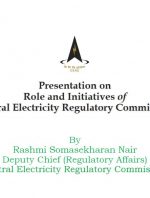
Role and Initiatives of CERC, India
Synopsis: Role and Initiatives of CERC, India – by Ms. Rashmi Nair, Deputy Chief (RA), CERC_SAFIR Working Group meeting, 4 Dec 2019, Dhaka, Bangladesh
Synopsis: 4th SAARC Regulators Meeting Bhutan Rajiv Ratna Panda 6-7 Feb 2020
Synopsis: Presentation on ” Regulatory and Policy Frameworks for deeper Energy/Electricity Integration, advancing Cross Border Energy Trade in South Asia by Mr. Pankaj Batra, Project Director and Rajiv Ratna Panda, Technical Head, SARI/EI/IRADE”
Synopsis: Presentation- Key Findings on Harmonization of grid codes,operating procedures and standards to promote/facilitate CBET in South Asia-Volume-III Report-Rajiv Panda-SARI-EI-IRADE
Synopsis: Experiences and Learnings from Competitive Power Market (power trading and exchange) Development in South Asian:-Approach for developing Competitive Regional Power Market in South Asia Mr. Rajiv Ratna Panda, IRADe/USAID SARI/EI, India in the SAARC Training Workshop on “System Operation and Settlement Mechanism, Cross Border Trade/Regional Power Market in South Asia”
Synopsis: Assessment and recommendation of commercial terms & conditions for Cross Border Electricity Trade (CBET) and suggesting the model Of Power Exchange in South Asian region.
Synopsis: To ascertain the feasibility of the South Asian Regional Power Exchange (SARPEX) with Bangladesh, Bhutan, India and Nepal (BBIN) as the participants.
Synopsis: The SARPEX Mock Exercise Project finds that basis the demand-supply and transmission conditions that prevailed in BBIN in FY’16, the DAM operation of SARPEX would benefit all the participating nations, resulting in the overall regional surplus of INR 323 Billion in a year, in both the modes.
Synopsis: Release of PPA & TSA, TF-3 meeting PPT
Synopsis: Session 2 Basics of Power Exchange Ray 17.01.2018
Synopsis: SARPEX PPT – 6th PSC meeting-Mr. Ray
Synopsis: NREL March2018 SARI meeting-David Palchak
Synopsis: Economic Benefits of Nepal-India-Bangladesh Electricity Trade-Dr. K Parikh
Synopsis: Overview of SARIEI Program,Progress ,Key Findings of various Studies, achievements, Annual Work Plan and Way forward-V K Kharbanda & Rajiv Ratna Panda
Synopsis: Theme Presentation Plenary Session on REGIONAL INTEGRATION AND ENERGY COOPERATION: SUCCESS THROUGH SYNERGY 6th SAARC CCI Business Leaders Conclave
Synopsis: SARPEX Mock Exercise Day Ahead Market ( DAM) in the South Asian Region-Mr. S.K. Ray, Technical Specialist, SARI/EI, IRADe and Mr. Gaurav Jain, Sr. Research Analyst, SARI/EI, IRADe
Synopsis: All Presentations -First Meeting of SAFIR Working Group on “Regulatory Cooperation to Facilitate Knowledge sharing, addressing Cross cutting Energy/Electricity Regulatory Issues and Capacity Building in South Asia” 15th-16th May, 2018, Hotel Taj Samudra, Colombo, Sri Lanka
Synopsis: All Presentations-Technical Visit to the Office of Public Utilities Commission of Sri Lanka by the Member’s of South Asia Forum For Infrastructure Regulation (SAFIR) Working Group
Synopsis: Plenary Address on “Trans-Regional Energy Connectivity Between the ASEAN Power Grid and the South-Asia Power Grid: Prospects and Opportunities” Rajiv Ratna Panda-22 – 23 May 2018 Vientiane, the Lao People’s Democratic Republic (Lao PDR)
Synopsis: URJA VICHAR MANCH program on 30th May 2018, New Delhi, India-South Asian Regional Power Exchange (SARPEX)Mock Exercise
Synopsis: South Asian Regional Power Exchange Need of a Day Ahead Market and its Possible Implication- Gaurav Jain, Senior Research Analyst, IRADe, SARI/EI
Synopsis: SARPEX: Market Design, Mock Exercise results & Rules and Recommendation-Mr. S.K. Ray, Technical Specialist, SARI/EI, IRADe
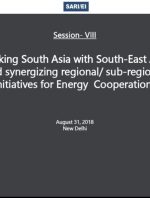
Linking South Asia with South-East Asia and synergizing regional/ sub-regional initiatives for Energy Cooperation
Synopsis: Linking South Asia with South-East Asia and synergizing regional/ sub-regional initiatives for Energy Cooperation by Tushar Sud
Synopsis: Theme Presentation Session -III Investments in Infrastructure for Cross Border Projects: Catalyzing Private Investments and Mitigating risks by V.K.Kharbanda
Synopsis: Theme Presentation Session-IV “Need for Coordinated Interconnection Transmission Planning and for Technical Institutional Mechanism in South Asia for Secure Reliable Grid Interconnection by Rajiv Ratna Panda
Synopsis: Theme Presentation Session-2 “Policies/Regulations and Institutional Mechanisms for Promoting Energy Cooperation & Cross Border Electricity Trade in South Asia” by Rajiv Ratna Panda
Synopsis: Presentation on Overview of South Asian Power Sector & SARI/EI Program by V K Kharbanda
Synopsis: Electricity Trade in BBIN region- Long Term Trading Volumes and Prospects by Dr. Probal Ghosh and Mr. Vinay Saini
Synopsis: Role of Think Tanks in enabling conducive environment and consensus building for CBET in South Asia by Mr. Rohit Magotra
Synopsis: 6th Task Force-1 Meeting on Coordination of Policy, Legal and Regulatory Framework –19th-20th July’ 2017-Peace Pagoda Hall, Hotel Water Front Resort, Pokhara, Nepal, Workshops & Conferences
Synopsis: NEPRA established as sole regulator of power sector in Pakistan through promulgation of the Regulation of Generation, Transmission and Distribution of Electric Power, Act No. XL of 1997 on 16th December, 1997 (i.e. NEPRA Act).
Synopsis: Date: 19th July 2017 , 6th Task Force-1 Meeting on Coordination of Policy, Legal and Regulatory Framework –19th-20th July’ 2017-Peace Pagoda Hall, Hotel Water Front Resort, Pokhara, Nepal, Workshops & Conferences
Synopsis: Electricity Act 2001 – Institutional level, clarity – policy vs. regulatory, political vs apolitical, internal vs external etc.
Synopsis: Date: 19th July 2017 , 6th Task Force-1 Meeting on Coordination of Policy, Legal and Regulatory Framework –19th-20th July’ 2017-Peace Pagoda Hall, Hotel Water Front Resort, Pokhara, Nepal, Workshops & Conferences
Synopsis: Date: 19th July 2017 , 6th Task Force-1 Meeting on Coordination of Policy, Legal and Regulatory Framework –19th-20th July’ 2017-Peace Pagoda Hall, Hotel Water Front Resort, Pokhara, Nepal, Workshops & Conferences
Synopsis: Date: 19th July 2017 , 6th Task Force-1 Meeting on Coordination of Policy, Legal and Regulatory Framework –19th-20th July’ 2017-Peace Pagoda Hall, Hotel Water Front Resort, Pokhara, Nepal, Workshops & Conferences
Synopsis: Release of Report On “Harmonization of Grid Codes, Operating Procedures and Standards to Facilitate/Promote Cross-Border Electricity Trad, Workshops & Conferences
Synopsis: The mock exercise results will provide the desired inputs for the decision makers in selecting a suitable option for market design. This will also give clarity about the identity of the buyers and sellers in such a Regional Exchange.
Synopsis: Further, the quantum of electricity that can be traded under cross border trade for electricity in Indian Power Exchanges shall be prescribed from time to time by the Designated Authority.
Synopsis: The mock exercise is based on the Unconstrained Market Clearing Principle. However, the availability of inter-country transmission lines has been duly taken into consideration in the preparation of bids for BBN
Synopsis: Finding out the most needed quantum of power – criticality of load to be served.
Synopsis: The stakeholder consultation helped in dissemination of SARPEX idea to the relevant sectors.
Synopsis: Policy intervention of Indian Govt . and regulatory framework needs to be updated accordingly. Necessary amendment for this regulation is required before finalization of the document.
Synopsis: Capacity Building Program on South Asian Regional Power Exchange (SARPEX) Mock Exercise 7th -9th February 2017 New Delhi, India
Synopsis: Capacity Building Program on South Asian Regional Power Exchange (SARPEX) Mock Exercise 7th -9th February 2017 New Delhi, India
Synopsis: Capacity Building Program on South Asian Regional Power Exchange (SARPEX) Mock Exercise 7th -9th February 2017 New Delhi, India
Synopsis: Capacity Building Program on South Asian Regional Power Exchange (SARPEX) Mock Exercise 7th -9th February 2017 New Delhi, India
Synopsis: Decades back, Dr. R. Buckminister Fuller proposed interconnecting regional power system into a single, continuous world-wide electric energy grid as a number one solution to solve many of the world’s pressing problems.
Synopsis: Presentation on “Potential for Power Trade in western part of South Asia”-V K Kharbanda
Synopsis: Task Force – 3, TF-3 4th Meeting
Synopsis: Task Force – 3, TF-3 4th Meeting
Synopsis: Task Force – 3, TF-3 4th Meeting
Synopsis: Report Release ‘Economic Benefits from Nepal–India Electricity Trade’ South Asia Regional Initiative for Energy Integration (SARI/EI) 19th Jan, 2017 | Kathmandu, Nepal, Workshops & Conferences
Synopsis: Report Release ‘Economic Benefits from Nepal–India Electricity Trade’ South Asia Regional Initiative for Energy Integration (SARI/EI) 19th Jan, 2017 | Kathmandu, Nepal, Workshops & Conferences
Synopsis: Capacity Building Program on South Asian Regional Power Exchange (SARPEX) Mock Exercise 7th -9th February 2017 New Delhi, India
Synopsis: Capacity Building Program on South Asian Regional Power Exchange (SARPEX) Mock Exercise 7th -9th February 2017 New Delhi, India
Synopsis: Capacity Building Program on South Asian Regional Power Exchange (SARPEX) Mock Exercise 7th -9th February 2017 New Delhi, India
Synopsis: Consumer Surplus. All the buyers whose bids were higher than MCP have been cleared. However they will get power at a price lesser than their bid price. Thus they get power at a price lesser than that they were willing to pay. This gain is called the consumer surplus and benefits all buyers on the curve OD.
Synopsis: Various bilateral and multilateral funding organizations (USAID-SARI/EI program, ADB-SASEC Program, SAARC, etc. are supporting the CBET which is necessary for economic growth of SA region.
Synopsis: Developing the framework and guidelines for Open Access & Trading License -Nepal Stakeholder Consultation Workshop
Synopsis: Need for Institutionalizing the Process of CBET such as Creating Forum/Association of Regulators(SAFER) , Forum/Association of Transmission utilities (SAFTU)
Synopsis: The guidelines deal only with limited areas where need for such common guidelins has been felt by the SAC and are not meant to be comprehensively dealing with all matters relatd to CBET.
Synopsis: Analysis of international experience in formation of regional regulatory forums for harmonization of electricity regulations from the perspective of CBET.
Synopsis: Government of India initiated the Process of Preparation of Cross Border Electricity Trade Policy and Development of Regulatory Framework for CBET.
Synopsis: Accessing Power Market in India, A Vibrant power market & power exchange exist . Prices are competitive. India APCC= 3.40 INR (0.05 US$/Kwh) Myanmar= 0.08 US$/Kwh ( 9 cents).
Synopsis: As per world bank estimates, SA countries needs to invest in the range of USD 1.7 trillion to USD 2.5 trillion( 2011-2020) to bring its power grids, roads, water supplies up to the stranded needed to serve the population.
Synopsis: An Year is divided into sub-time periods or Time-slices to capture the fluctuations within a day Total number of time-slices for an year is 288 i.e. 2304 time-slices in the model horizon.
Synopsis: As per world bank estimates, SA countries needs to invest in the range of USD 1.7 trillion to USD 2.5 trillion( 2011-2020) to bring its power grids, roads, water supplies up to the stranded needed to serve the population.
Synopsis: “Regional Regulatory Guideline” and “Suggested Changes/Amendments in Electricity Laws, Regulations and Policies
of South Asian Countries for Promoting Cross Border Electricity Trade in the South Asian Region”- Launched.
Synopsis: Both reservoir and pumped storage hydropower are flexible sources of electricity that can help in handle the variability of other renewable energy such as wind power and photovoltaic electricity.
Synopsis: Task Force Members are represented by government nominated members from Regulatory Technical , market related institution of each SA countries.
Synopsis: Both reservoir and pumped storage hydropower are flexible sources of electricity that can help in handle the variability of other renewable energy such as wind power and photovoltaic electricity.
Synopsis: In CBET, non-discriminatory access to their respective transmission systems increases opportunities for any party to sell/buy electricity at a cost-reflective fee and to take advantage of the load and time diversity and contribute to better utilization of resources.
Synopsis: Since countries have different licensing rules and procedures, a harmonized licensing framework ensures that licensing does not restrict entry. It provides regulatory tools that helps regulators to keep an oversight of the market.
Synopsis: With Such High Level of Cross Border Interconnection being envisaged, it is obvious that for safe, reliable and stable operation of the interconnected transmission system, the various technical aspects of grid codes, operating procedures and standards needs to be harmonized/coordinated.
Synopsis: Recommendations in line with existing practices followed in most SACs and CBET contracts Recommendation in line with the practice followed in recent CBET contracts (Bangladesh/Nepal); CERC in India also follows this principle.
Synopsis: To identify the electricity trading potential of the South Asian nations (Bangladesh, Bhutan, Nepal, India, Sri
Lanka, Pakistan)over a period of next 20 years.
Synopsis: Many analysts have recognized the value of development of power exchange and related market mechanism to enhance Cross border Electricity Trade (CBET) among the South Asian Nations.
Synopsis: A macro-economic SAM based model covers the whole economy balances supply and demand for each sector, also investment and savings, balance of payment for each year, etc.
Synopsis: Exchanges in India offers standardised contracts and competitive platform and allow market based price discovery. Governing regulations and policy development are still at nascent stage in many countries, this will allow other countries to align the relevant rules for development of a harmonized market.
Synopsis: 2nd November 2016 , Workshops & Conferences
Synopsis: 5th Meeting of Project Steering Committee-Maitland State Room Mount Lavinia Hotel, Colombo, Sri Lanka 9th and 10th November,2016
Synopsis: 5th Meeting of Project Steering Committee-Maitland State Room Mount Lavinia Hotel, Colombo, Sri Lanka 9th and 10th November,2016
Synopsis: Medium Term, Long Term, Grant of Access, Protection Coordination, Standards, Metering Security, Reliability, Scheduling, Despatch, Congestion Mgmt., SCADA/EMS, Ancillary Service.
Synopsis: Incomplete Works, including any shortfall in Contracted Capacity or Station Heat Rate, to be completed within 180 days. For further delay, Damages for each day at the lower of 0.1% of the Performance Security and 0.2% of the cost of completing such items as estimated by the Utility’s Representative.
Synopsis: Provided that such open access may be allowed before the cross subsidies are eliminated, on payment of surcharge in addition to the charges for wheeling as may be determined by the State Commission.
Synopsis: The BEA issues licenses and monitors the performance of the licensees to ensure compliance with the provisions of Acts, Regulations, Standards, Codes, etc., For instance, the Bhutan Electricity Authority (BEA) has granted license to Dagachhu Hydropower Corporation Limited (or Licensee) to carry out the activities of construction, generation, supply, and export.
Synopsis: Many analysts have recognized the value of development of power exchange and related market mechanism to enhance Cross border Electricity Trade (CBET) among the South Asian Nations.
Synopsis: With High Level of Cross Border Interconnection being envisaged, it is obvious that for safe, reliable and stable operation of the interconnected transmission system, the various technical aspects of grid codes, operating procedures and standards needs to be harmonized/coordinated.
Synopsis: Review of the Grid Codes of the respective South Asia nations covering procedures/codes/standards such as Power system operating procedures, protection code, metering code, connection code, planning code, system security, demand estimation systems, outage planning, recovery procedures etc.
Synopsis: The guidelines deal only with limited areas where need for such common guidelines has been felt by the SAC and are not meant to be comprehensively dealing with all matters related to CBET.
Synopsis: 5th Meeting of Project Steering Committee-Maitland State Room Mount Lavinia Hotel, Colombo, Sri Lanka 9th and 10th November,2016
Synopsis: 5th Meeting of Project Steering Committee-Maitland State Room Mount Lavinia Hotel, Colombo, Sri Lanka 9th and 10th November,2016
Synopsis: 5th December 2016 , Workshops & Conferences
Synopsis: Regional Regulatory Guidelines is one of the outcome of the TF-1 study on Review of Electricity Laws, Policies and Regulatory framework of SAC to identify critical requirements of CBET and recommend changes/amendments therein for consideration of the SA countries.
Synopsis: With Such High Level of Cross Border Interconnection being envisaged, it is obvious that for safe, reliable and
stable operation of the interconnected transmission system, the various technical aspects of grid codes, operating procedures and standards needs to be harmonized/coordinated.
Synopsis: Grid Code details the rules, procedures, guidelines, criteria and responsibilities to be complied with by the users, owners and operators of the transmission system of a country.
Synopsis: International experiences suggesting a strong and robust regional regulatory institutional mechanism for harmonization and coordination of regulations.
Synopsis: To identify the electricity trading potential of the South Asian nations (Bangladesh, Bhutan, Nepal, India, Sri Lanka, Pakistan, Maldives and Afghanistan) over a period of next 20 years by reviewing the existing long term Demand-Supply projections of the participating countries.
Synopsis: Interconnection between thermal based systems and hydro systems allows the surplus hydro production to be fully utilized and also “firms up” the hydro system capacity in times of drought.
Synopsis: The Core objective of the SARI/EI Program is to promote integration of Energy System and enhance Cross border Electricity Trade (CBET) among the South Asian Nations.
Synopsis: Transmission licensee shall submit proposal to regulatory commission to procure power from any new generation plant or for expansion of generation capacity from existing plant based on future demand forecast specified in Least Cost Long Term Generation Expansion Plan.
Synopsis: The study covers a range of demand growth, renewable development, interconnection scenarios and other scenarios to properly assess the scenarios for economic impact of CBET.
Synopsis: The current phase of the USAID SARI/EI initiative is to create the right “Enabling environment to support the establishment of a South Asian Electricity Market and gain consensus and support from the key decision makers and stakeholders.
Synopsis: Requirement of investors to take up large projects in hydro sector for sustainable cash flows which can be done by investment friendly policies in the region.
Synopsis: Study on Review of Electricity Laws, Regulations, Policies (EL&R&P) & Legal Structure of South Asian Countries (SAC) to Identify Areas that can Hinder Cross Border Electricity Trade (CBET) and to recommend changes/ mendments therein for consideration of the SAC.
Synopsis: The Agency for the Cooperation of Energy Regulators (ACER) in the Europe is a pivotal body that issues non-binding opinions and recommendations to national energy regulators, transmission system operators, and the EU institutions on CBET.
Synopsis: To facilitate coordination and harmonization of regulatory issues that have a bearing on CBET. This would involve the preparation of guidelines, regulatory opinions, monitoring of implementation and provision of technical assistance.
Synopsis: Bangladesh has shown interest for making investment in hydro Power Projects being developed in Nepal and Bhutan (Regional Investment). SAARC has conducted prefeasibility studies for Regional /Sub-regional Power Plant.
Synopsis: To facilitate coordination and harmonization of regulatory issues that have a bearing on CBET. This would involve the preparation of guidelines, regulatory opinions, monitoring of implementation and provision of technical assistance.
Synopsis: Regulatory Workshop on “Cross-Border Energy Trade – Issues before Regulators in the South Asia Region “was successfully held on 19th- 20th February, 2013 at Kathmandu, Nepal.
Synopsis: Review of Electricity Laws, Regulations and Policies (EL&R&P) of SAC (South Asia Countries) to identify areas that can hinder cross border electricity trade and exchange to recommend changes therein for consideration of the SAC.
Synopsis: Currently, focus is bilateral and on case to case basis. Bhutan and Nepal have specific provisions in their laws relating to CBET. Specific provisions in electricity laws in the long term are extremely important and will provide conducive environment.
Synopsis: USEA plans to deliver training that goes beyond standard workshops, but instead will be a tailored transfer of best practices, reference documents and toolkits for the Nepalese to help them establish the appropriate institutional and operational frameworks for cross-border trade.
Synopsis: On 27 November 2014, Foreign Ministers of the eight member states signed an agreement on energy cooperation ‘SAARC Inter-Governmental Framework Agreement (IGFA) for Energy Cooperation (Electricity)’ during the concluding ceremony of the 18th SAARC Summit.
Synopsis: Transmission planning agencies of the Government to plan the crossborder grid interconnections through bilateral/trilateral/mutual agreements between the concerned states based on the needs of the trade in the foreseeable future through studies and sharing technical information required for the same.
Synopsis: Balance Responsible Party mechanism : the needed link between the physical reality and the market.
Synopsis: The Balancing Market (BM) enables RTE to activate power reserves of generation plants, in order to restore the system supply demand balance and solve network congestions. It is based on a permanent, transparent and open call for tender process.
Synopsis: The price in Germany and France actually is the reference price for the rest of Europe. It is of an utmost importance that this reference price comes from a transparent market with sufficient volumes traded and with a sufficient number of actors.
Synopsis: As central counterpart, ECC is in charge of physical settlement and therefore is active as a shipper on all involved European TSOs. Payment of the delivered energy is processed every day, therefore securities deposits are very small.
Synopsis: TenneT is Europe’s first cross-border grid operator for electricity. With approximately 20,000 kilometres of (Extra) High Voltage lines and 36 million end users in the Netherlands and Germany we rank among the top five grid operators in Europe.
Synopsis: TenneT actively contributes to the further integration of the European energy market and the development of a North West European electricity market (NWE).
Synopsis: A power forward contract is an agreement between two counter parties for the delivery of electricity at a certain time in the future for a certain price that is agreed and fixed at the start of the contract.
Synopsis: This shows that the energy sector is progressively moving away from conventional generation technologies towards a renewable energy scenario. Wind power was the leading technology in terms of new installation accounting for 32% (11,2GW) of the new installations in 2013, followed by solar PV with a 31% (11 GW) and gas with a 21% (7,5 GW).
Synopsis: They need a reliable partner that can provide independent market information (transparency) and market access
(liquidity).
Synopsis: This slideshow provides general information that has, for
education (illustration) purposes, been simplified for certain aspects.
Synopsis: Power Exchange mobilizes the bids and offers in the market for the Market Coupling: without this market participation, the Market Coupling would not work. Also, the exchange has to do substantial infrastructure investments and activities to participate in the Market Coupling.
Synopsis: Time allowance for special market procedures such as handling of curtailment situations or price threshold reached via a second auction used by CWE PXs or the NPS-applied regulated routines that include peak load capacity (production/load) reserves activation.
Synopsis: The modular infrastructure will support the entire market management operation from scheduling processes, to imbalance management, to settlement – all while maintaining optimal service and adaptability to future market conditions.
Synopsis: Aligning National Electricity Policy to recognize CBET as an integral part of the national electricity plan by reviewing existing electricity plan and review of laws, acts ,policies for identifying specific provision/clauses that impacts CBET.
Synopsis: Study on Review of Electricity Laws, Regulations, Policies (EL&R&P) & Legal Structure of South Asian Countries (SAC) to Identify Areas that can Hinder Cross Border Electricity Trade (CBET) and to recommend changes/amendments therein for consideration of the SAC.
Synopsis: Early phases of SARI/E concentrated on a “top down” process focusing on bringing parties together and identifying a decision making frameworks for developing projects.
Synopsis: The various issues like technical complexities, risk of national grid interconnection, potential economic and financial benefits from interconnections.
Synopsis: Identify technically and economically feasible cross border interconnections considering generation capacity additions in pipeline over next 20-30 years. Evaluate electricity available for cross border exchange.
Synopsis: Task force is at the heart of the SARI/EI Program. PSC committee will also be consulted and their guidance/directives will also be taken in account in conducting the working of the Task Forces.
Synopsis: In order to ensure optimal management of the electricity transmission network and to allow trading and supplying electricity across borders in the Countries, South Asian Network of TSOs may be established.
Synopsis: In the Gazette for Merchant Power Plant published in 2008, there is provision for open access in transmission.
Synopsis: Establish basic rules, procedures, guidelines and standards to be followed by various Licensees and all power utilities connected to the Transmission System so as to plan, develop, maintain and ensure secure, reliable and efficient operation of the Transmission System in economic manner.
Synopsis: The Fault Clearance Time for a fault on the Grid where the Generator’s Equipment are connected or on the Generator’s System where the Grid Owner’s Equipment are connected shall not be longer than 120 ms for 132 kV and 220 kV and 150 ms for 66kV systems.
Synopsis: The transmission system between India and Sri Lanka will involve a submarine cable as the Indian Ocean separates India and Sri Lanka. This interconnection would be different from any other electricity interconnections planned in the
South Asia Region.
Synopsis: Identify and obtain the system planning and demand forecast, generation Expansion plans etc. Furnish data formats for -system data collection just in case studies are required to be conducted.
Synopsis: Absence of cross border power trade agreement which governs all the policy aspects of trade including market access. Inadequacy of existing legal and regulatory system for enhancing power trade.
Synopsis: Various policy initiatives by central and state governments coupled with appropriate tariff regulations and other measures by regulatory commissions to promote generation from these sources resulted in quantum jump in capacity addition.
Synopsis: Bangladesh is a strong believer of regional cooperation. Bangladesh strongly believes that an Integrated Energy Market through transnational trade of electricity through Win-Win options removing unnecessary conflicts can ensure the Energy Security in the region.
Synopsis: The implication is that the potential for development and growth in the rural sector, given appropriate investment, is significant, with access to energy as a contributory element. The 2012 Asia Foundation Survey of
the Afghan People found that 14 per cent of respondents identified lack of electricity as a major problem in their local areas.
Synopsis: Program Secretariat shall be provided by IRADe. It would facilitate holding of the task force meetings, prepare agenda, and coordinate the meetings and would issue minutes.
Synopsis: South Asian countries are at various levels of electricity regulation, institutional and power sector reforms therefore laws, acts and correct policies are crucial for bringing in transparency, accountability. These are essential to build confidence for private sector participation and enhance energy availability in the region.
Synopsis: Setting up program steering committee with membership from all countries to provide strategic vision and guidance to program and working towards consensus & trust building.
Synopsis: legal and regulatory framework to identify the most beneficial investment opportunities for the overall system, define the ground rules on the allocation of costs and risks and create a congenial environment for investors in generation and transmission.
Synopsis: Electricity trade increases sector revenues and can avoid or defer national generation investment costs. For example, Bhutan’s power exports contributes 25% of its GDP and 60% of State revenues.
Synopsis: It is sometimes described as being the center or heart of Asia, connecting South and East Asia with Central and Western Asia. Kabul is the capital and largest city of Afghanistan.
Synopsis: The power sector , as per the Afghanistan National Energy Policy draft, which reflects the commitment of the Islamic Republic of Afghanistan to poverty reduction and private sector economic growth and stable Afghanistan.
Synopsis: The transmission system between India and Sri Lanka will involve a submarine cable as the Indian Ocean separates India and Sri Lanka. This interconnection would be different from any other electricity interconnections planned in the South Asia Region.
PSC Meetings
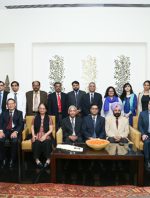
- Date : September 28, 2020
- Country : Delhi, India

- Date : June 28, 2019
- Country : Delhi, India

- Date : March 8, 2018
- Country : Taj Samudra Hotel, 25, Galle Face Center Road, Colombo, Sri Lanka

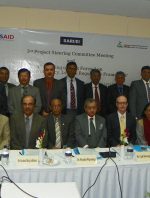
- Date : December 17, 2014
- Country : Dhaka Division, Bangladesh
The 3rd Project Steering Committee (PSC) meeting and 4th Meeting of Task Force 1 of SARI/EI was held on 17th and 18th December 2014 at Dhaka, Bangladesh. Members of the
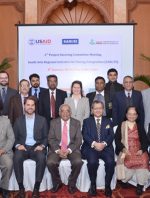

Task Force Meetings
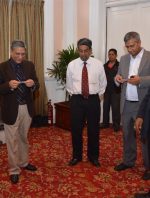
- Date : February 19, 2014
- Country : Colombo, Western Province, Sri Lanka
Members of Task Force from various South Asian Countries along with representatives from IRADe, USAID attended the meeting.
